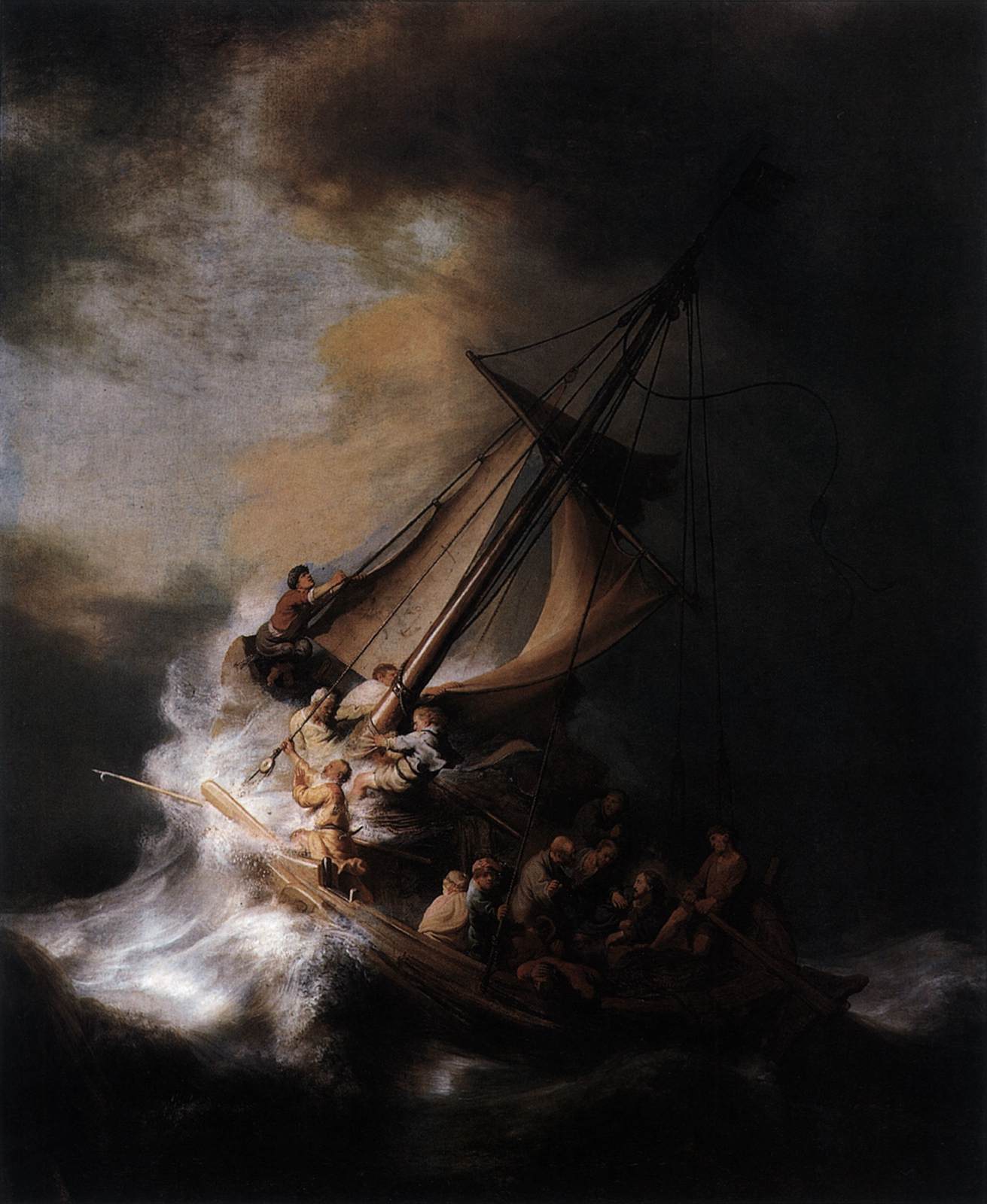Christ in the Storm on the Sea of Galilee, Rembrandt, 1633
Isabella Stewart Gardner Museum, Boston, USA [Web Gallery of Art]
Readings
(Jerusalem Bible: Australia,
England & Wales, India [optional], Ireland, New Zealand, Pakistan,
Scotland, South Africa)
Gospel Mark 4:35-41 (New Revised Standard Version, Catholic Edition, Canada)
On that day, when evening had come, Jesus
said to his disciples, “Let us go across to the other side.” And leaving
the crowd behind, they took him with them in the boat, just as he was. Other
boats were with him. A great windstorm arose, and the waves beat into the
boat, so that the boat was already being swamped. But he was in the stern,
asleep on the cushion; and they woke him up and said to him, “Teacher, do you
not care that we are perishing?” He woke up and rebuked the wind, and said
to the sea, “Peace! Be still!” Then the wind ceased, and there was a dead calm. He
said to them, “Why are you afraid? Have you still no faith?” And they were
filled with great awe and said to one another, “Who then is this, that even the
wind and the sea obey him?”
The very first pastoral visit outside of Rome of Pope Francis was to the small island of Lampedusa, the most southerly part of Italy. He went there on 8 July 2013 because of his concern about the plight many migrants and refugees trying to get from North Africa to Europe through Lampedusa and the many who died in trying to do so. The vast majority of these were exploited 'boat people' who had spent all they had, handing over their money to unscrupulous persons who were becoming rich by living off the poor and not caring whether they lived or died.
In his homily that day Pope Francis asked, 'Has any one of us grieved for the death of these brothers and sisters? Has any one of us wept for these persons who were on the boat? For the young mothers carrying their babies? For these men who were looking for a means of supporting their families?'
The question the Pope asked in a way echoes that of the Apostles in the boat to Jesus: 'Teacher, do you not care that we are perishing?'
LÉ Eithne
Since 16 May LÉ Eithne, the flagship of the Irish Naval Service has been engaged, along with ships of navies of other European countries, in the Mediterranean in an effort to rescue 'boat people'. This one small ship has already rescued 1,620 men women and children. The Irish Naval Service has a total personnel of 1,144.
It is estimated that between 2000 and 2014 around 22,000 undocumented immigrants died trying to reach Italy from North Africa. In April alone this year it is reckoned that more than 1,000 died in a number of incidents.
Something similar is happening in South-East Asia with refugees and asylum seekers from Myanmar/Burma, Rohingya people who are Muslims, and from Bangladesh being shunned.
So this Sunday's gospel speaks to us of a situation that is all too common in the contemporary world.
The Apostles discovered that Jesus did care: 'He woke up and rebuked the wind, and said to the sea, “Peace! Be still!”' And he shows that same care to the refugees in the Mediterranean and in South-East Asia through the authorities, agencies and individuals who are trying to alleviate their immediate dangerous situation while others try to deal with the roots and causes of that situation.
There is an expression in the English language, 'We're all in the same boat', that indicates especially in a difficult or dangerous situation that all are equal and that all are responsible in some way for changing that situation. In his new encyclical, Laudato Si': On Care for Our Common Home, Pope Francis echoes this (No 13): 'The urgent challenge to protect our common home includes a concern to bring the whole human family together to seek a sustainable and integral development, for we know that things can change. The Creator does not abandon us; he never forsakes his loving plan or repents of having created us. Humanity still has the ability to work together in building our common home.'
We can do two things. We can and should pray for all those caught up in the human tragedy of refugees and asylum seekers desperately seeking a better life as they flee from areas of conflict and hopelessness, being exploited ruthlessly by others in their plight - surely an expression of the reality of evil, of sin and of the Devil that Pope Francis frequently speaks about - and often losing their lives in the process.
And we can start reading the Pope's encyclical, whether online or in printed form, while reflecting on it, praying while doing so, and asking the Lord how he wants each of us to change the way we live so that the world, all its creatures and especially we humans made in God's image and likeness will become what God wills for us all.
'God saw everything that he had made, and indeed, it was very good' (Genesis 1:31).
Responsorial Psalm [NAB - Philippines, USA]


No comments:
Post a Comment